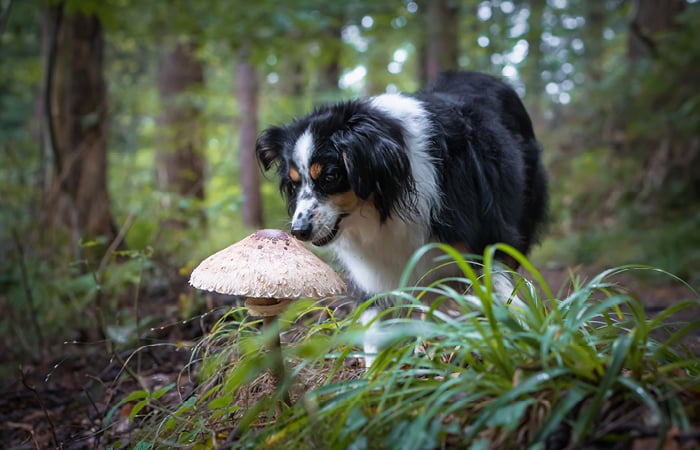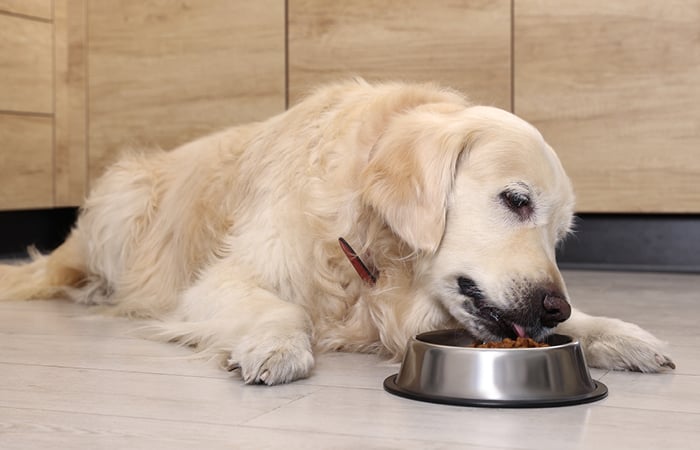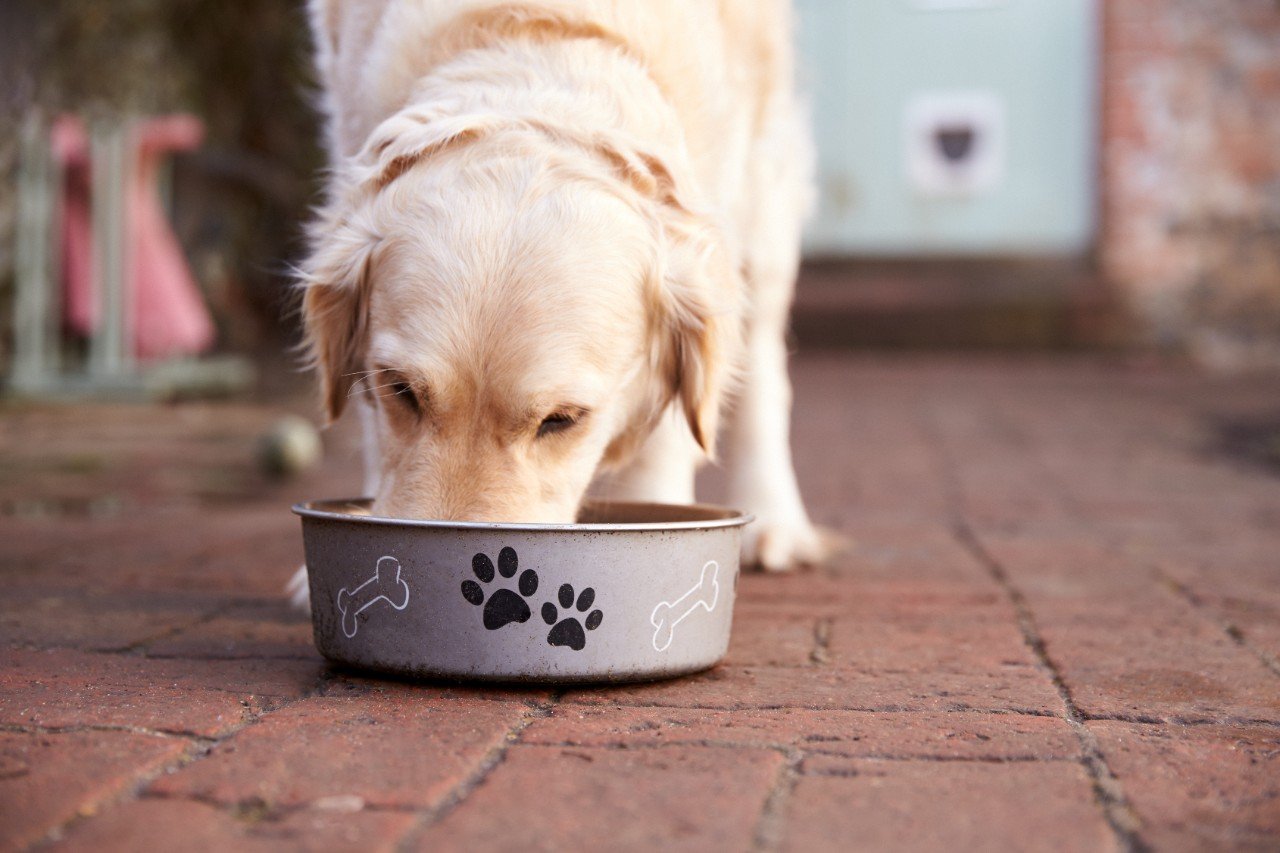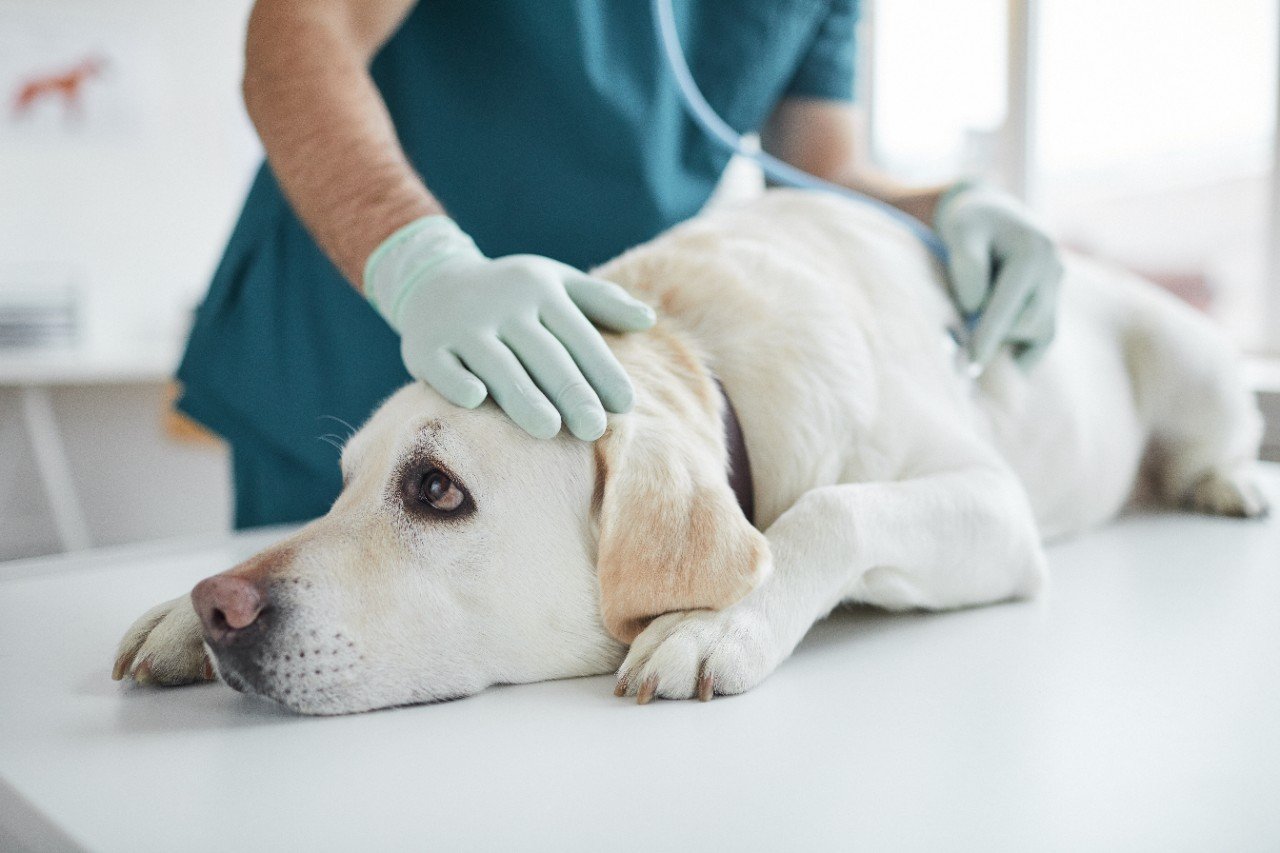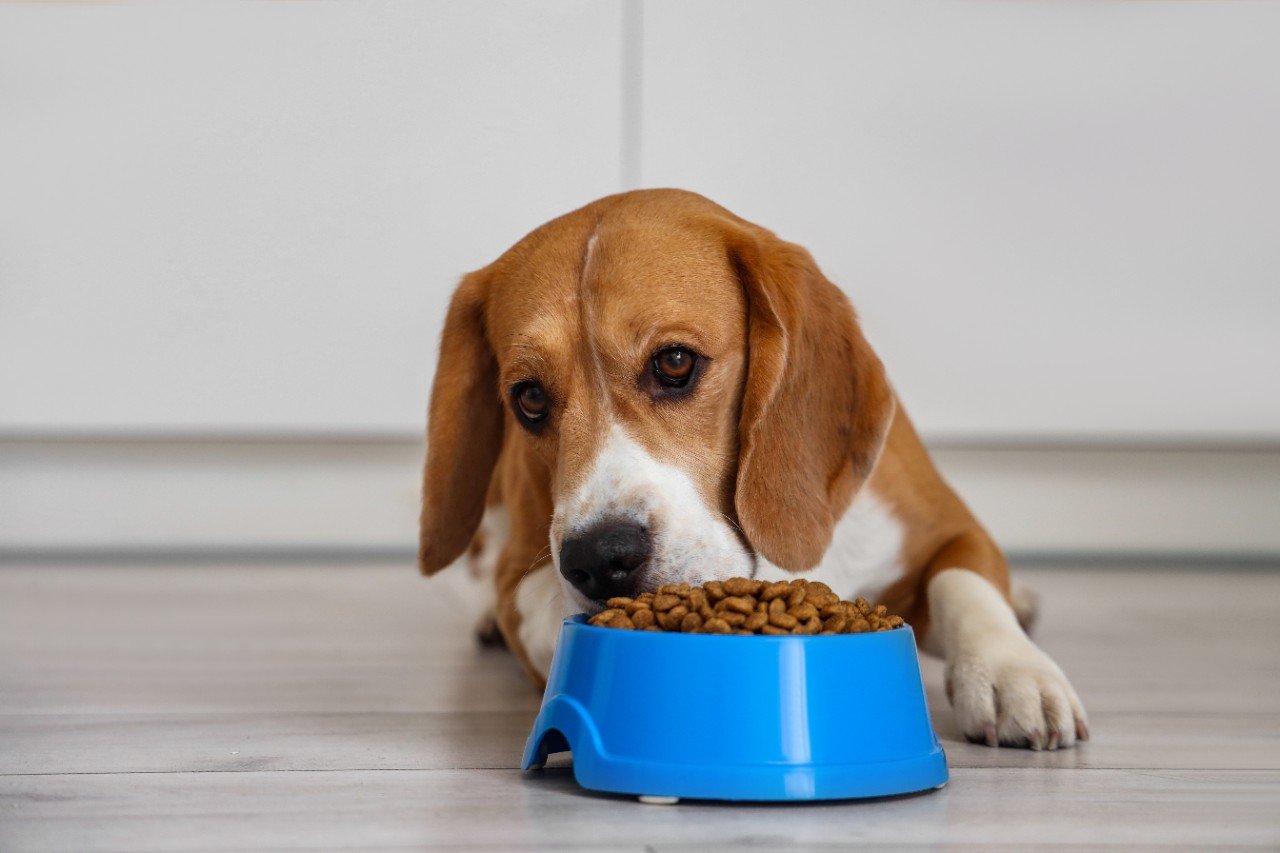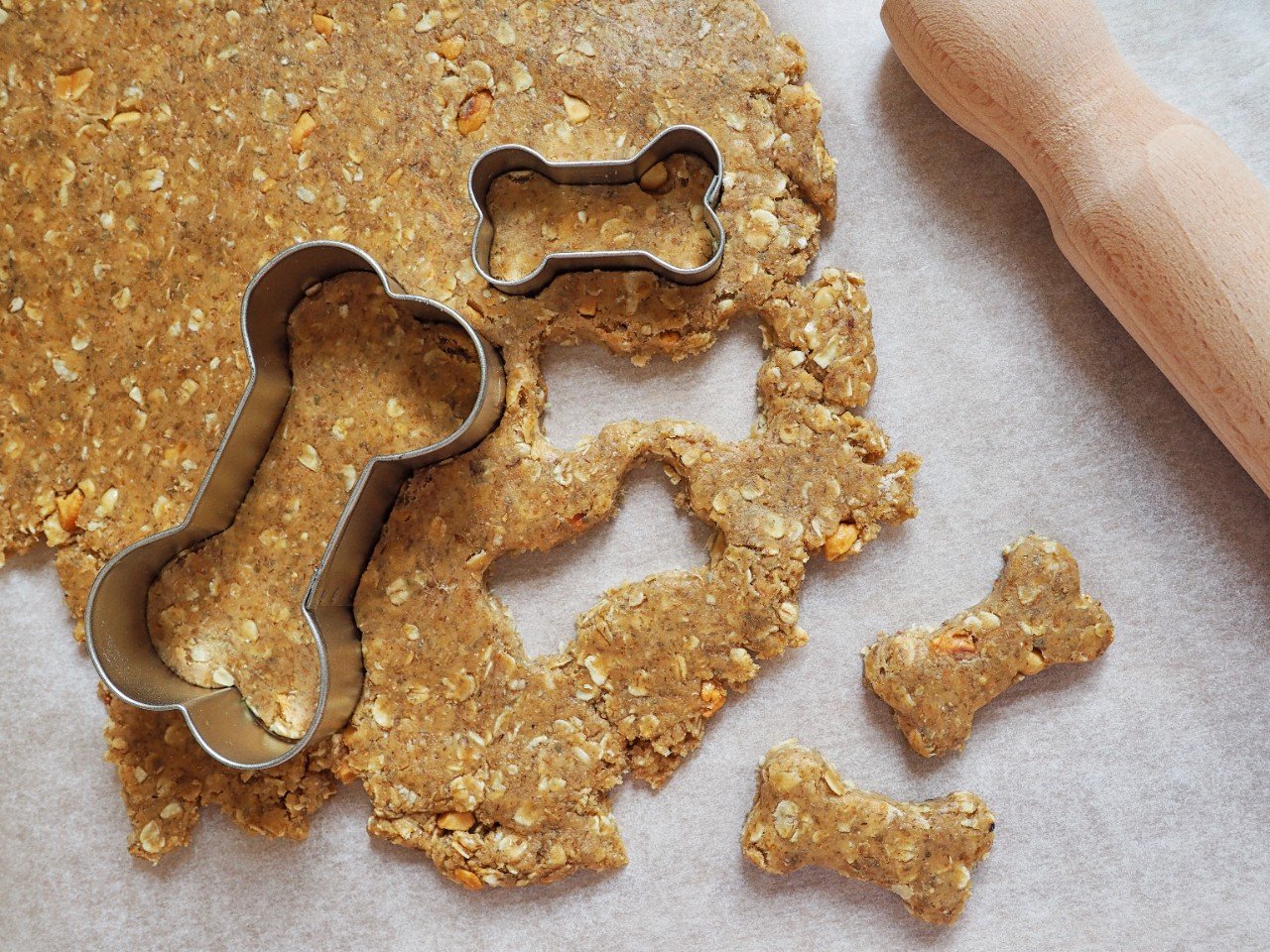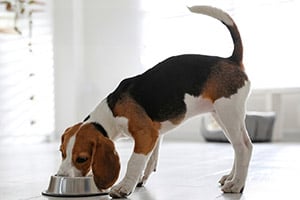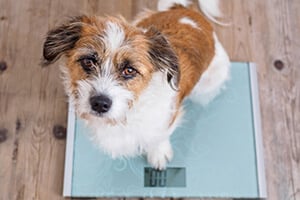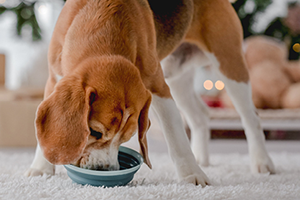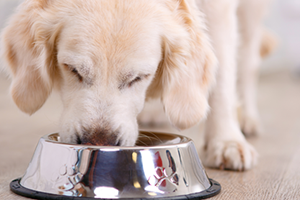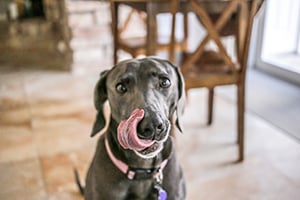Most dog owners have heard their dog’s stomach gurgling, but you might not know why it happens or what to do about it. While stomach noises aren’t usually anything to worry about, sometimes they can be a sign of digestive issues.
Dog stomach gurgling: causes and what to do

Quick Links
Why is my dog's stomach making noise?
Intestinal noises are known as borborygmus or borborygmi. They are the result of water, gases and digested food moving through your dog’s digestive system.
Is it normal for a dog's stomach to make noises?
It isn’t abnormal for your dog’s tummy to make some noises. Sometimes you might not be able to hear these, and other times you might hear your dog’s intestines gurgling loudly. However, these noises can become more pronounced and frequent in dogs with intestinal upsets.
Stomach noises in dogs: common causes
Here are some of the most common reasons you might hear your dog’s abdomen making noises.
Hunger pangs
Just like us, dogs can get rumbly tummies when they’re hungry. This usually happens when their stomach is empty, so you might hear their intestines rumbling first thing in the morning, or just before their mealtimes.
Digestive processes
Your dog’s digestive system is constantly active, and often the noises you hear aren’t from their stomach, but from their intestines. In this case, the noises are caused by a wave-like movement within the intestines called peristalsis, whereby muscle contractions move food through the intestines.
Dietary indiscretion
Eating too quickly
When dogs eat their food too quickly, they can end up swallowing air. This might cause a range of noises, as well as hiccups, passing gas or even vomiting.
Gastrointestinal issues
Certain gastrointestinal issues, such as pancreatitis and inflammatory bowel disease, can cause rumbling noises, alongside other symptoms such as vomiting, diarrhoea and changes in appetite.
Parasites and infections
Internal parasites such as worms – and infections such as giardia, salmonella and coccidia – can lead to increased intestinal noises.
Serious conditions
Sometimes, stomach noises are caused by serious conditions, such as bloat or intestinal blockages. Gurgling noises will usually be accompanied by serious symptoms such as restlessness, rapid breathing, retching and a swollen abdomen. If you notice any of these signs, schedule an urgent vet visit.
Stomach gurgling: when to worry
Most of the time, your dog’s stomach rumbling isn’t anything to worry about. But sometimes it can be a sign that something’s wrong. Knowing what to look out for can help you act quickly if needed.
Symptoms to look out for include:
- Vomiting
- Diarrhoea
- Lethargy
- Loss of appetite
If your dog’s abdominal noises are accompanied by vomiting, diarrhoea, lethargy or loss of appetite, it’s best to speak with your vet as soon as possible.
If you have dog insurance with Petplan, you can also use the free Pet Expert Chat feature to connect with vet professionals, 24/7. Simply log into your My Petplan account and go to the My Support area to get started.
Duration and frequency of noises
If you hear your dog’s stomach gurgling every now and again, remember this is normal for most dogs. But if your dog’s stomach is gurgling loudly, extremely frequently, or for a long time, it’s best to schedule a vet appointment.
Try to make a note of when the noises happen – for example, before meals or after a certain type of food. Check whether they’re also accompanied by signs of pain or discomfort, such as pacing or whining.
How to prevent your dog's stomach from gurgling and what to do
If you’re concerned about how often your dog’s tummy is making noises, speak to your vet and follow these tips.
Dietary adjustments
High-quality food can help prevent any noises caused by allergies, sensitivities or gastrointestinal issues. Avoid feeding table scraps, as these can be high in fat and sometimes contain unsuitable ingredients.
If you’re switching your dog onto a new food, gradually introduce this over a few days, so their digestive system has time to adjust.
Slow feeding techniques
Slow feeder bowls, puzzle feeders and licky-mats encourage fast-eating breeds such as Labradors and Beagles to eat more slowly. This reduces the chance of them gulping air as they eat, which can cause stomach noises.
Probiotics and digestive aids
Probiotics can help rebalance the healthy bacteria within your dog’s digestive system, which may reduce gurgling noises. Adding small amounts of digestive aids such as pumpkin or plain yoghurt can also help, but always ask your vet for advice before introducing new foods to your dog’s diet.
Regular exercise
Daily exercise helps keep your dog’s gastrointestinal tract moving smoothly, reducing the chances of unexpected gurgles or other noises.
Regular walks are also a great time to keep an eye on your dog’s toileting habits, which can help you spot any signs of digestive issues as soon as possible.
Frequently asked questions
If you can hear your dog’s stomach making noises, keep an eye on their behaviour. If they’re acting normally and aren’t showing any signs of pain, you probably don’t need to give them anything. Check they’re interested in their food and their toilet habits are normal. If you’re worried, speak to your vet for advice.
A sloshing sound sometimes means there’s excess fluid or gas in your dog’s digestive system. Maybe your dog drank a lot of water on an empty stomach, or ate too fast and inhaled some air. Usually, the sloshing sound will soon stop. If it doesn’t, or if your dog seems unwell, ask your vet for advice.
If your dog has an upset tummy, they may not feel like eating. Make sure they have access to clean, fresh water. You can try offering them a bland meal, such as rice with boiled chicken, to see if this helps settle their stomach. If they’re showing signs of pain, vomiting or diarrhoea, contact your vet.
Petplan is a trading name of Pet Plan Limited (Registered in England No. 1282939) and Allianz Insurance plc (Registered in England No. 84638), Registered office: 57 Ladymead, Guildford, Surrey GU1 1DB.
Pet Plan Limited is authorised and regulated by the Financial Conduct Authority. Financial Services Register No. 311969. Allianz Insurance plc is authorised by the Prudential Regulation Authority and regulated by the Financial Conduct Authority and the Prudential Regulation Authority. Financial Services Register No. 121849. Pet Plan Limited is a subsidiary of Allianz Insurance plc.



